Healthcare SEO Strategy for 2023
Healthcare SEO improves online visibility for healthcare websites, making them easily found online.
And for SEO you need a strategy because without a strategy, results will look dark, weak, and untraceable.
But why are we talking about SEO in the healthcare segment?
Simple because about 7% of daily Google searches are health-related, with nearly 70,000 searches performed every minute (Source).
This figure indicates that healthcare SEO is important. Let us read further to understand what is SEO for healthcare and what is healthcare SEO strategy?
What is Healthcare SEO Strategy?
Healthcare SEO strategy is the practice of optimising healthcare facilities online to get more traffic online.
It is about boosting a business’s and healthcare provider’s web presence. The goal of healthcare SEO is to improve visibility on the search engine and gain higher rankings on Google SERP.
You know that SEO increases brand awareness, organic traffic, and authority that leads to greater success. In the example below, on searching the diagnostic centre and pathology lab, Google displayed the following results. It shows that Dr. Lal PathLabs had executed their SEO strategy.
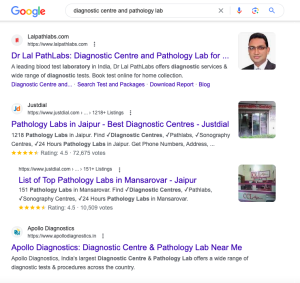
Source: www.google.com
Read: SEO Guidebook
By healthcare SEO, it means that you share meaningful information and blogs for the readers that keep them glued to your site. And if a reader spends more time on your website, it means the bounce rate of the website is low.
Lower bounce rate is an indication of higher probability of ranking on search engines.
Let us now see what it takes to optimise a healthcare website.
Healthcare SEO (Search Engine Optimization) includes strategies and techniques to improve healthcare websites’ visibility and ranking on search engine results pages (SERPs).
Some of the key elements of healthcare SEO include:
- Keyword research: Identifying and using relevant keywords that potential patients may use to search for healthcare services.
- On-page optimization: Optimising individual pages on a website to make them more search engine-friendly, including using meta tags, optimising images, and ensuring the content is relevant and informative.
- Off-page optimization: Building high-quality links from other authoritative websites to improve the overall authority and credibility of the healthcare website.
- Local SEO: Optimising a healthcare website to rank well for local searches, including local keywords, Google My Business optimization, and local directories.
- Content creation: Creating high-quality and informative content such as blog posts, videos, and infographics for social media and other platforms can attract more traffic to the healthcare website.
- Mobile optimisation: Ensuring the healthcare website is mobile-friendly and easily accessible on different devices, including smartphones and tablets.
Why does SEO Matter in Healthcare Marketing?
Today’s market is competitive and without search engine optimization businesses have higher possibilities of failing. In the present scenario, these businesses cannot win the market only on referral basis which is why SEO matters for healthcare marketing.
Read these reasons that validate the requirement of SEO for healthcare marketing:
SEO (Search Engine Optimization) is essential in healthcare marketing for several reasons:
- Increased visibility: Healthcare organisations can improve their visibility and reach more potential patients through SEO. By adding relevant keywords and providing high-quality content, healthcare organisations can increase their visibility on search engine results pages (SERPs).
- Better patient engagement: SEO can help healthcare organisations engage with patients more effectively. Healthcare organisations can attract and retain more patients by creating informative content and optimising their websites for local searches.
- Cost-effective marketing: Optimising the website for search engines is a cost-effective marketing strategy compared to traditional marketing methods like print ads, billboards, and television commercials. Healthcare organisations can reach a larger audience and generate more leads at a lower cost.
- Increased credibility: Healthcare organisations that rank high on search engine results pages (SERPs) are perceived as more credible and trustworthy. Patients are more likely to choose healthcare providers that rank on the top of the search engine results.
- Competitive advantage: Healthcare organizations can gain a competitive advantage by implementing effective SEO strategies. They can attract more patients and generate more revenue.
The Healthcare SEO Trends For 2023
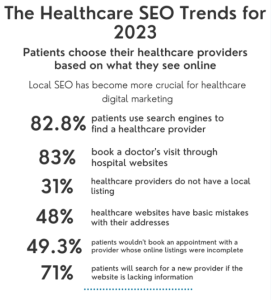
As we move ahead in 2023, here are some key healthcare SEO trends to watch out for
- Voice search optimization: Increased popularity of voice search assistants like Siri, Alexa, and Google Assistant, healthcare organisations need to optimise their website content for voice search queries. This means using long-tail keywords, natural language, and conversational tone in website content.
- Video optimization: Video content is becoming increasingly popular, and healthcare organisations must optimise their content for search engines. This includes using relevant keywords in video titles and descriptions, providing accurate transcripts, and ensuring videos are mobile-friendly.
- Artificial Intelligence (AI) and machine learning: AI and machine learning are becoming more prevalent in healthcare, and this trend is expected to continue in 2023. Healthcare organisations can use AI-powered tools to optimise their SEO strategy by analysing user behaviour and search patterns to provide more personalised content.
- Local SEO: Local SEO is becoming more critical for healthcare organisations as patients increasingly rely on search engines to find healthcare providers in their local area. Healthcare organisations can optimise their local SEO by ensuring their Google My Business profile is up-to-date, using local keywords in website content, and building high-quality local links.
- User experience (UX): User experience is becoming increasingly important in SEO as search engines emphasise websites that provide a positive user experience. Healthcare organisations need to ensure their website is easy to navigate, loads quickly, and offers high-quality content that meets the needs of their target audience.
What SEO practices should health marketers know?
Health marketers should be familiar with the following SEO practices:
Keyword research:
Identifying the relevant keywords that potential patients may use to search for healthcare services is crucial. Health marketers should use tools like Google Keyword Planner to research keywords and prioritise those that have high search volume and low competition.
Here is what you can do for keyword research:
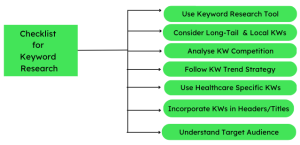
- For an extensive keyword list, it is better you identify your target audience as well as their search intent.
- Identify relevant healthcare topics and themes to focus on.
- Keyword research tools like Google Keyword Planner, SEMrush, or Ahrefs to discover relevant keywords can be of great help.
- Consider long-tail keywords that are more specific and have less competition.
- Analyse keyword search volume and competition to prioritise valuable keywords.
- Look for healthcare-specific keywords related to your services, treatments, or medical conditions.
- Pay attention to local keywords if you have a geographically specific audience.
- Explore related keywords and phrases to expand your keyword list.
- Monitor and adapt your keyword strategy based on trends and changes in the healthcare industry.
- Incorporate keywords naturally into your website content, titles, meta descriptions, and headers.
On-page optimisation:
Health marketers should ensure that each page of the healthcare website is optimised for search engines by using relevant keywords in meta tags, headings, and content. They should also provide website content that is informative and high-quality, with relevant images and videos.
Here are some techniques for on-page optimization:
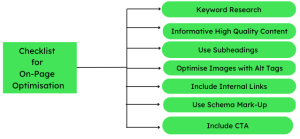
- Use relevant keywords and phrases to include in your content.
- Better to use the target keyword in the page title, meta description, URL, and content.
- Write informative, high-quality content that meets the needs and interests of the target audience.
- Use subheadings (H1, H2, H3) to break up the content and make it easy to read.
- Optimise images using descriptive file names and alt tags that include the target keyword.
- Include internal links to other relevant pages on your website to improve navigation and user experience.
- Ensure the website is mobile-friendly and loads quickly by using a responsive design and optimising images.
- Add social sharing buttons to encourage visitors to share your content on social media.
- Use schema-markup making it easy for search engines to understand what the content is about.
- Include a call-to-action (CTA) to encourage visitors to take a specific action, such as booking an appointment or contacting the healthcare provider.
- Refresh the content to ensure it stays relevant and up-to-date.
Off-page optimisation:
Building high-quality links from other authoritative websites is essential for improving the overall authority and credibility of the healthcare website. Health marketers should focus on building backlinks from reputable websites in the healthcare industry.
Here are some techniques for off-page optimization:
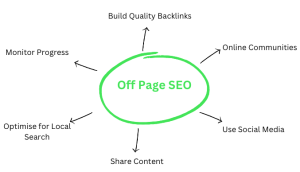
- Build high-quality backlinks from authoritative and relevant websites in the healthcare industry.
- Use social media platforms to share content and engage with followers, which can help attract more traffic and improve brand visibility.
- Participate in online healthcare communities and forums to build relationships with other professionals in the industry and promote your healthcare website.
- Collaborate with other healthcare professionals and organisations to create valuable content and build backlinks.
- Monitor and respond to online reviews to improve the reputation of the healthcare website and attract more patients.
- To improve local search visibility, submit the healthcare website to online directories, such as Yellow Pages and Google My Business.
- Use influencer marketing to partner with healthcare influencers and thought leaders to promote the healthcare website and build backlinks.
- Create high-quality guest posts and articles for other healthcare websites, which can help build backlinks and improve the authority of the healthcare website.
- Use online PR strategies to create buzz around healthcare events, new services, or innovative treatments, which can help attract media coverage and build backlinks.
- Monitor online mentions of the healthcare brand and respond promptly to any negative comments or reviews to protect the reputation of the healthcare website.
Mobile optimisation:
With the increasing use of mobile devices, health marketers should ensure that the healthcare website is mobile-friendly and easily accessible on different devices, including smartphones and tablets.
Here are some tips for healthcare SEO mobile optimisation in bullet points: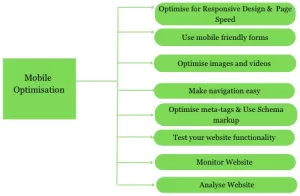
- Implement a responsive design for your healthcare website.
- Optimise page speed by minimising file sizes and leveraging caching.
- Use mobile-friendly content formattings, such as shorter paragraphs and clear headings.
- Ensure all images and videos are optimised for mobile devices.
- Make navigation easy and intuitive on mobile screens.
- Implement mobile-friendly forms and ensure they are easy to fill out.
- Utilise schema markup to enhance mobile search visibility.
- Optimise meta tags and titles for mobile search results.
- Test your website on various mobile devices to ensure proper functionality.
- Monitor and analyze mobile traffic and user behaviour to make necessary improvements.
Local SEO:
Health marketers should optimise the healthcare website for local search by including local keywords, optimising the Google My Business profile, and building local citations and backlinks.
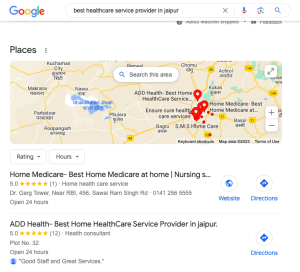
Source: www.google.com
Here are some tips for doing local SEO for a healthcare service provider:
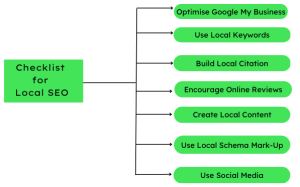
- Claim and optimise Google My Business: Claiming and optimising your Google My Business profile is critical for local SEO. Ensure your profile includes accurate and up-to-date information, including business name, address, phone number, and website URL.
- Use local keywords: Use keywords and phrases in your website content, meta descriptions, and titles. This will help search engines better understand your location and improve your visibility in local search results.
- Build local citations: List your business in online directories and citation sites, such as Yelp, Yellow Pages, and local chambers of commerce. This will help improve your local search visibility and make it easier for potential patients to find you.
- Encourage online reviews: Encourage patients to leave reviews of your healthcare services online on Google, Yelp, and other relevant review sites. Positive reviews can improve your online reputation and attract more patients.
- Create local content: Create high-quality content tailored to your local area. This could include blog posts, infographics, and videos providing valuable information about your local community’s health care issues.
- Use local schema markup: Use local schema markup to provide additional information about your business, including your address, phone number, and hours of operation. This can improve your visibility in local search results and make it easier for potential patients to find you.
- Use social media: Use social media to connect with potential patients in your local area and share updates about your healthcare services. This can help improve your visibility and attract more patients.
Content creation:
Creating high-quality and informative content, including blog posts, videos, and infographics, is essential for improving search engine rankings and attracting more traffic to the healthcare website.
Health marketers should focus on creating content that addresses the needs and concerns of their target audience.
Here are some content creation tips for healthcare SEO:
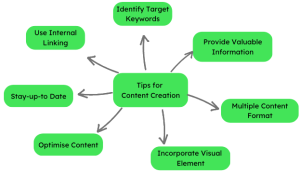
- Identify target keywords: Research and identify relevant keywords commonly searched for by your target audience. These keywords can be used to optimise your content for search engines and improve your visibility in search results.
- Provide valuable information: Create high-quality content that provides helpful information to your target audience. This can include informative blog posts, how-to guides, infographics, and videos that answer common healthcare questions or address specific healthcare concerns.
- Use a variety of content formats: Use a variety of content formats to keep your audience engaged and interested. This can include text-based content, images, videos, podcasts, and interactive content such as quizzes or surveys.
- Incorporate visual elements: Use high-quality images, graphics, and videos to break up text and make your content more engaging and visually appealing. Visual elements can also help to illustrate complex healthcare concepts and improve understanding.
- Optimise content for search engines: Optimise your content by including target keywords in titles, meta descriptions, and throughout the range. However, avoid keyword stuffing, which can harm your search engine rankings.
- Use internal linking: Use internal linking to link to other relevant content on your healthcare website. This can improve user experience and keep visitors on your site longer, improving search engine rankings.
- Stay up-to-date: Stay up-to-date with the latest healthcare news, trends, and research and use this information to create timely and relevant content. This can help position your healthcare brand as a thought leader and improve your online reputation.
Analytics and monitoring:
Health marketers should use tools like Google Analytics to monitor website traffic and track key performance indicators (KPIs) such as bounce rate, time on page, and conversion rate. This information can be used to adjust the SEO strategy and improve website performance.
Here are vital tips for analytics and monitoring in bullet points:
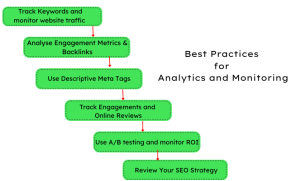
- Track search engine rankings for target keywords
- Monitor website traffic using tools like Google Analytics
- Analyse engagement metrics such as bounce rate, time on site, and pages per session
- Monitor backlinks to ensure they are high-quality and relevant
- Track engagement on social media platforms, including likes, comments, and shares
- Monitor online reviews on relevant review sites such as Google and Yelp
- Use A/B testing to test different variations of landing pages and website elements
- Set up conversion tracking to measure patient conversions and ROI
- Regularly review and adjust your SEO strategy based on the data and insights gathered through analytics and monitoring.
Conclusion
Healthcare SEO is a crucial component of any healthcare marketing strategy. By implementing best practices such as conducting thorough keyword research, optimising on-page and off-page elements, creating high-quality content, and monitoring and analysing website performance, healthcare providers can improve their online visibility and attract more patients to their services.
By prioritising local SEO, healthcare providers can target patients in their local area and improve their chances of ranking higher in relevant search results. And by consistently monitoring and adjusting their healthcare SEO strategy, providers can continue to improve their online presence and ultimately drive more patient conversions. Connect with us to get your next hit SEO strategy.
FAQ
What is a healthcare SEO strategy?
Healthcare SEO strategy is a set of techniques and tactics specifically designed to optimise the online presence of healthcare websites and improve their visibility in search engine results. It involves optimising website content, conducting keyword research, building authoritative backlinks, and implementing technical SEO elements to attract more organic traffic and enhance the online reputation of healthcare providers.
Why is healthcare SEO strategy important?
Healthcare SEO strategy is important because it helps healthcare providers and organisations increase their online visibility, reach a wider audience, and attract potential patients. By ranking higher in search engine results, healthcare websites can gain credibility and trust and ultimately generate more patient leads and appointments.
What are some critical elements of a successful healthcare SEO strategy?
Key features of a successful healthcare SEO strategy include optimising website content with relevant keywords, improving website loading speed, ensuring mobile-friendliness, implementing schema markup for better search visibility, acquiring authoritative backlinks from reputable healthcare websites, and creating high-quality and informative healthcare-related content.
How long does it take to see results from healthcare SEO efforts?
The time it takes to see results from healthcare SEO efforts can vary depending on website authority, competition, and the strategies implemented. Generally, it takes several months to see noticeable improvements in search engine rankings, organic traffic, and patient conversions. Consistency and ongoing optimization are key for long-term success.
Should healthcare providers hire an SEO agency for their SEO strategy?
Hiring an SEO agency can benefit healthcare providers lacking the expertise or resources to implement an effective SEO strategy. SEO agencies specialise in healthcare SEO and can provide valuable insights, technical expertise, and industry-specific knowledge to improve search engine rankings and attract more patients. However, it’s essential to carefully evaluate and choose a reputable agency with a proven track record in healthcare SEO.



